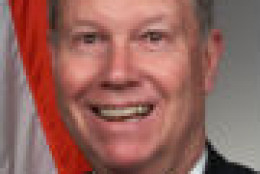Hubbard Radio Washington DC, LLC. All rights reserved. This website is not intended for users located within the European Economic Area.
Defense News
-
Cyber déjà vu can happen when the same or similar cyber attacks hit multiple agency networks. But cyber déjà vu can be a good thing if your agency looks at the problem in a different way. That's according to Greg Boison, director of Homeland Cybersecurity at Lockheed Martin. On In Depth with Francis Rose, he shared three ways to take advantage of cyber déjà vu to turn your agency's strategy from reactive to proactive.
March 19, 2015 -
Two priorities shape the way the United States Army will drive its business: Warfighting and enterprise information environment mission areas. Those priorities are more important in an Army where human power, and budget, is getting smaller. Doug Wiltsie is program executive officer for Enterprise Information Systems for the Army. On In Depth with Francis Rose, Doug laid out three priorities for 2015 and he says the first one is uninterrupted capability delivery.
March 18, 2015 -
Dr. Mica Endsley, chief scientist of the Air Force, works to combat cyber concerns. "I would prioritize defense of our computer systems to be probably among the highest priorities that we have today," she tells Federal News Radio's Agency of the Month radio show.
March 18, 2015 -
The Air Force owns a huge stockpile of intercontinental ballistic missiles and bombers that are quickly aging in place. It owns two out of three legs of the US nuclear triad; the Navy owns the third. Maj. Gen. Garrett Harencak, assistant chief of staff for strategic deterrence and nuclear integration for the Air Force, tells Federal News Radio's Jason Fornicola how the service is modernizing its two legs of the US nuclear triad.
March 17, 2015 -
You might remember Charla Nash. She's the woman who was horribly disfigured when attacked by a friend's pet chimpanzee back in 2009. The Pentagon has been closely watching her long recovery. More than watching, actually. The Army has paid hundreds of thousands of dollars of Nash's medical bills. The hope is Nash's ordeal can help the military learn to care for disfigured soldiers returning from war. Dr. Wendy Dean, a medical advisor in the Army's Tissue Injury and Regenerative Medicine Program Management Office, joined Tom Temin on the Federal Drive with more on the effort and what the military hopes to learn.
March 17, 2015 -
Under a new agreement, GSA would reduce the Army's fee to use the professional services governmentwide acquisition contract to 0.1 percent from 0.75 percent. This is the second major MOU signed by GSA and a military service.
March 17, 2015 -
The new maritime strategy for the Navy, Marine Corps, and Coast Guard relies on four key tenets that shape how the services will face future challenges. Bryan McGrath, a former naval officer, is managing director of the FerryBridge Group, and assistant director of the Hudson Center for American Seapower. On In Depth with Francis Rose, he said those four ideas will not only cause debate among strategy purists in the defense community, but they also cement the legacy of Chief of Naval Operations Adm. Jonathon Greeenert.
March 16, 2015 -
The U.S. Air Force will award a contract for a long-range strike bomber this year. That contract could completely change the landscape of the aerospace industry, according to Richard Aboulafia. He's vice president of analysis at the Teal Group Corporation. On In Depth with Francis Rose, he said if there's only one thing to pay attention to in the aerospace industry this year, this contract is it.
March 12, 2015 -
Maj. Gen. Garrett Harencak, the Air Force's Assistant Chief of Staff for Strategic Deterrence and Nuclear Integration, balances work to fulfill President Obama's vision with the need to keep U.S. nuclear capabilities viable. "As long as nuclear weapons exist, we'll maintain a safe, secure and effective stockpile for us and our allies," he tells Federal News Radio's Agency of the Month radio show.
March 12, 2015 -
Cuts to service contracts are part of an Army-wide push to use soldiers and civilians for jobs that had been outsourced by necessity during wartime, officials said Wednesday.
March 12, 2015 -
Trying to predict the future isn't the best way to prepare for future threats. Instead the Defense Department should focus on becoming a master at responding to new and unforeseen challenges. That's according to retired Air Force Lt. Col. Dan Ward, the author of "FIRE: How Fast, Inexpensive, Restrained, and Elegant Methods Ignite Innovation." On In Depth with Francis Rose, he offered ways to speed up DoD's acquisition response time and innovation.
March 11, 2015 -
Military contractor requirements seem simple enough: Get the right material to the right location on time. Some contractors are better at it than others. It's true that you get what you measure, which is why the military branches have the Contractor Performance Assessment Reporting System (CPARS). They use it to create an incentive program to spur on suppliers. Bobby Smart, the Air Force's deputy assistant secretary for Acquisition Integration, joined the Federal Drive with Tom Temin to explain how the system works.
March 11, 2015 -
The military already has shown it can improve services on bases through public-private partnerships. As budgets shrink, the next task is to partner with local governments.
March 11, 2015 -
Dave Gwyn and Chris Howard, vice presidents of Federal sales at Nutanix, join host John Gilroy to discuss how their company can help your agency move to cloud and consolidate its data. March 10, 2015
March 10, 2015













